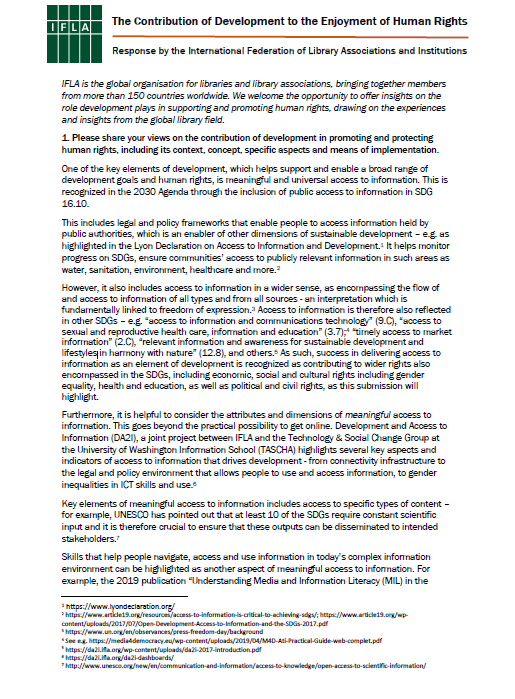Access to Information as a Dimension of Development: Supporting and Enabling Fundamental Human Rights
16 March 2021
Meaningful access to  information – including access infrastructure, user skills, relevant content, supportive policy frameworks – helps deliver on people’s civil, economic, social and cultural rights. IFLA’s response to a recent Office of the High Commissioner for Human Righs (OHCHR) questionnaire highlights good practices and insights from the library field on how to maximise and deliver on this potential.
information – including access infrastructure, user skills, relevant content, supportive policy frameworks – helps deliver on people’s civil, economic, social and cultural rights. IFLA’s response to a recent Office of the High Commissioner for Human Righs (OHCHR) questionnaire highlights good practices and insights from the library field on how to maximise and deliver on this potential.
A 2019 Human Rights Council resolution drew attention to the crucial contribution of development to enjoyment of human rights – and the mutually reinforcing relationship between the two. From gender equality to poverty eradication, identifying good practices and challenges and facilitating global cooperation helps stakeholders deliver on both sustainable development and fundamental rights.
In fact, as a 2019 UNDP blog pointed out, more than 90% of Sustainable Development Goals and targets align with corresponding human rights obligations. So what insights can we draw on the contribution of development to the enjoyment of human rights?
In response to a recent OHCHR questionnaire, an IFLA submission highlighted that:
- Meaningful access to information is a key dimension of development. This is reflected in a number of SDG targets and in other publications emphasising the contribution of access to relevant content, digital inclusion, and skills to navigate the information ecosystem to development.
- As an indicator and driver of development, access to information supports and enables a wide range of human rights. These include freedom of expression and the right to take part in government; the right to health and education, and cultural rights.
- Measures that foster meaningful access to information can draw on available good practices and lessons learned from the global library field. Inspiring examples range from public access facilities in Lithuanian libraries helping users find employment to rural health libraries in Nepal, Bhutan and India. Infrastructure, capacity-building and enabling policy frameworks help realise the synergy between access to information as a form of development and fundamental human rights.
You can access IFLA’s response on our publications page.